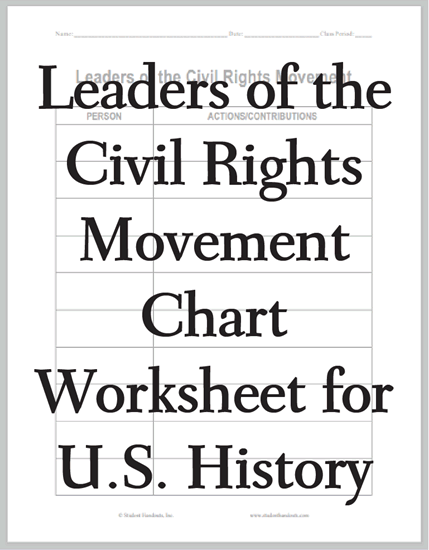| Leaders of the Civil Rights Movement Blank Chart Handout |
|---|
| www.studenthandouts.com ↣ U.S. History ↣ Decades of Change ↣ Worksheets |
 |
    |
|
Students list the names of leaders of the civil rights movement, alongside each person's contributions.
Click here to print (PDF file). Answers will vary. The 1960s civil rights movement was a pivotal moment in American history, marked by the leadership of numerous figures who championed the cause of racial equality and justice. Here are some of the principal leaders of the civil rights movement in the 1960s. Dr. Martin Luther King, Jr.: Dr. King is perhaps the most iconic figure of the civil rights movement. He was a Baptist minister and a gifted orator who advocated for nonviolent protest and civil disobedience. His leadership was instrumental in major events like the Montgomery Bus Boycott, the March on Washington for Jobs and Freedom, and the Civil Rights Act of 1964. Rosa Parks: Rosa Parks is often called the "mother of the civil rights movement." Her refusal to give up her bus seat to a white man in Montgomery, Alabama, in 1955 sparked the Montgomery Bus Boycott, a significant early victory in the movement. Malcolm X: A prominent civil rights leader, Malcolm X initially advocated for black separatism and self-defense but later shifted his views toward a more inclusive approach. His legacy includes his emphasis on black pride and self-determination. John Lewis: John Lewis was a key leader in the civil rights movement and one of the "Big Six" leaders of organizations that organized the March on Washington. He played a significant role in the civil rights protests, including the Selma to Montgomery marches. James Farmer: As the co-founder of the Congress of Racial Equality (CORE), Farmer was a prominent advocate for nonviolent direct action and played a vital role in the Freedom Rides, which challenged segregation in interstate transportation. Ella Baker: A civil rights activist and organizer, Ella Baker was a behind-the-scenes force in the movement. She was instrumental in the founding of the Southern Christian Leadership Conference (SCLC) and was a mentor to many young activists. Medgar Evers: Medgar Evers was the first field secretary for the Mississippi NAACP and a civil rights activist. He was tragically assassinated in 1963 for his work in the civil rights movement. Fannie Lou Hamer: A powerful voice for voting rights and civil rights, Fannie Lou Hamer was a key figure in the Mississippi Freedom Democratic Party and the Student Nonviolent Coordinating committee (SNCC). Whitney Young: Whitney Young was a prominent leader in the National Urban League, advocating for economic and social equality. He worked to connect the civil rights movement with economic opportunities. Bayard Rustin: Bayard Rustin was a chief organizer of the 1963 March on Washington. He was known for his dedication to nonviolent resistance and his work behind the scenes to coordinate major civil rights events. These leaders, among many others, played essential roles in advancing the civil rights movement during the 1960s. Their dedication, courage, and unwavering commitment to justice contributed to significant legislative achievements and a profound shift in American society toward greater racial equality. |
| www.studenthandouts.com ↣ U.S. History ↣ Decades of Change ↣ Worksheets |








